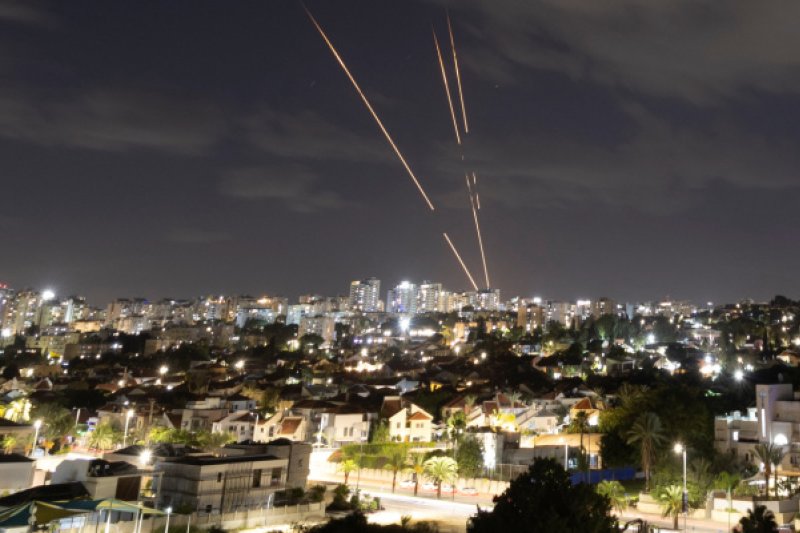Iran Launches Barrage of Missiles at Israel
Iran fired a salvo of ballistic missiles at Israel on Tuesday, forcing the Jewish state’s entire civilian population to take cover in bomb shelters.
“A short time ago missiles were launched from Iran into the territory of the State of Israel,” a spokesperson for the Israel Defense Forces (IDF) said. “You are asked to be vigilant and act exactly according to the instructions of the Home Front Command. The IDF is doing and will do everything necessary to protect the citizens of the State of Israel.”
The IDF posted on X/Twitter that “all Israeli civilians” were sheltering from the Iranian attack.
Alarms sounded across Israel and explosions could be heard in Jerusalem and the Jordan River valley. Reuters journalists reported seeing missiles being intercepted in the airspace of neighboring Jordan.
According to Israeli army radio, nearly 200 missiles had been launched into Israel from Iran.
“The air-defense system is fully operational, detecting and intercepting threats wherever necessary, even at this moment,” said Rear Adm. Daniel Hagari, the IDF spokesman. “However, the defense is not hermetic.”
Israel‘s military later said Israelis were free to leave their shelters.
“Following the situational assessment, it was decided that it is now permitted to leave protected spaces in all areas across the country,” the military said.
According to Hagari, the IDF was not immediately aware of any injuries resulting from the Iranian missile attack. However, according to Israeli media reports, there was one casualty: a Palestinian man in the West Bank village of Nu’eima, near Jericho, who was killed by missile shrapnel during the attack.
Hagari said that some projectiles made impact in the center and south of Israel and warned there were would be consequences for Iran without elaborating.
“We are on high alert both defensively and offensively,” the IDF spokesman said in a TV broadcast. “We will defend the citizens of the State of Israel. This attack will have consequences. We have plans, and we will operate at the place and time we decide.”
Iran’s Islamic Revolutionary Guard Corps (IRGC), an Iranian military force and internationally designated terrorist organization with significant political and economic influence, said Iran had launched “tens of missiles” at Israel and that if Israel retaliated, Tehran’s response would be “more crushing and ruinous.”
Iran had initially vowed to retaliate for the killing of Hamas leader Ismail Haniyeh in Tehran in late July. The Israeli government has neither confirmed nor denied responsibility for the assassination, although the Iranian regime blamed Jerusalem.
It was widely expected that Iran would launch a direct attack on Israel; however, no such attack ever came.
Then Iran said it would retaliate following Israeli airstrikes over the last two weeks that killed the top leaders of its Hezbollah allies in Lebanon, including longtime Hezbollah leader Hassan Nasrallah. IRGC deputy commander Abbas Nilforoushan was also killed in the same strike as Nasrallah.
Iran backs both Hamas and Hezbollah, providing the Islamist terrorist groups with weapons, funding, and training.
“After a period of restraint, Iran has targeted the heart of the occupied territories with tens of missiles following the martyrdom of Ismail Haniyeh … the intensification of the Zionist regime’s attacks on Lebanon and Gaza, the martyrdom of Hezbollah leader Hassan Nasrallah and [of] Guards Commander Abbas Nilforoushan,” the IRGC reportedly said.
A senior Iranian official told Reuters that the missile launches were ordered by Iran’s so-called “supreme leader,” Ayatollah Ali Khamenei, and that Tehran is “fully prepared” for an Israeli response. According to Reuters, Khamenei has remained in a secure location since the Israeli airstrikes on Beirut that killed Nasrallah last week.
Tuesday’s missile barrage came after Israel said its troops launched limited ground raids into neighboring Lebanon, where Iran’s chief proxy force Hezbollah wields significant influence and has been firing drones, missiles, and rockets at northern Israeli communities almost daily for the past year.
About 80,000 Israelis have been forced to evacuate and flee their homes amid the relentless attacks. Israeli leaders have said they are committed to making it safe for the displaced citizens to return to their homes, even if that means using military force to push Hezbollah forces further away from the Israel-Lebanon border.
US officials had reportedly said earlier on Tuesday that they had indications Iran was preparing to imminently launch a ballistic missile attack against Israel and that Washington was actively supporting preparations to defend the Jewish state, its closest Middle Eastern ally.
US President Joe Biden said the United States was prepared to help Israel defend itself from Iranian aggression.
“We discussed how the United States is prepared to help Israel defend against these attacks, and protect American personnel in the region,” Biden posted on X/Twitter about a meeting held with Vice President Kamala Harris and the White House national security team earlier in the day.
White House National Security Council spokesperson Sean Savett later said on X that Biden and Harris were monitoring the attack from the White House situation room and receiving regular updates. According to the council, Biden directed the US military to support Israel’s defense and shoot down Iranian missiles.
In April, Iran launched what was then an unprecedented direct attack on Israeli soil. In that attack, Iran fired some 300 missiles and drones at Israel, nearly all of which were downed by the Jewish state and its allies. The failed barrage was in retaliation for an alleged Israeli airstrike on the Iranian consulate in Syria’s capital of Damascus that killed seven IRGC members, including two senior commanders. One of the commanders allegedly helped plan the Palestinian terrorist group Hamas’s Oct. 7 massacre across southern Israel. Israel neither confirmed nor denied involvement in the incident.
Iran’s latest attack came one day after Israeli Prime Minister Benjamin Netanyahu warned nowhere in the Middle East was beyond its reach to strike.













